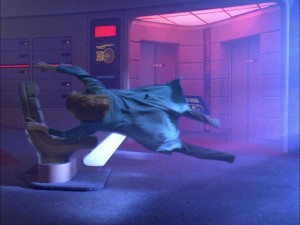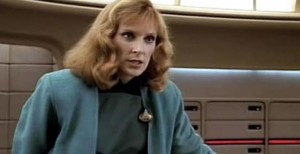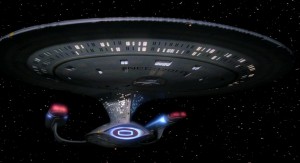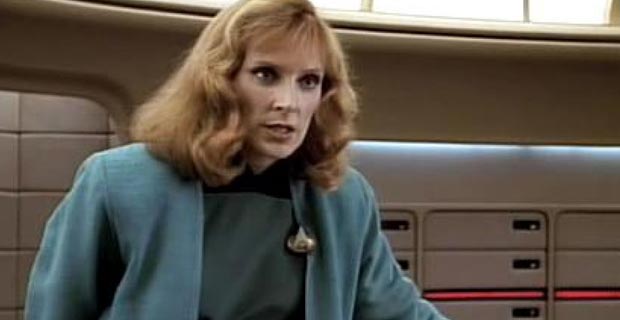In “Remember Me,” Dr. Beverly Crusher, usually so cool and collected under pressure, faces a severe test of her sense of sanity. As she struggles to make sense of the relentless disappearance of Enterprise crewmembers, she clings tenaciously to the scientific method as her best defense against madness. It’s one of Gates McFadden’s best performances. She expertly balances passion, professionalism, and paranoia. I don’t think any other hour of TNG showcases her so well.
 It turns out, of course, that Beverly is really the one who’s vanished, inadvertently sucked up by Wesley’s experiment o’ the week, a weird and wacky warp bubble. Wes and Geordi try to create a way out of the bubble for her. It manifests within Beverly’s rapidly shrinking reality as a wild, violent vortex. It’s her only possible means of escape but, not recognizing it, she resists its pull. She holds on to whatever fixtures are at hand—a medical console in sickbay, the Ops station on the bridge—in order to avoid falling into this maelstrom. Only after she realizes the nature of her predicament can she let go and surrender herself to the swirling storm.
It turns out, of course, that Beverly is really the one who’s vanished, inadvertently sucked up by Wesley’s experiment o’ the week, a weird and wacky warp bubble. Wes and Geordi try to create a way out of the bubble for her. It manifests within Beverly’s rapidly shrinking reality as a wild, violent vortex. It’s her only possible means of escape but, not recognizing it, she resists its pull. She holds on to whatever fixtures are at hand—a medical console in sickbay, the Ops station on the bridge—in order to avoid falling into this maelstrom. Only after she realizes the nature of her predicament can she let go and surrender herself to the swirling storm.
The dimension-manipulating Traveler (Eric Menyuk, reprising his role from “Where No One Has Gone Before”) tells Wes, “Together we may be able to open a gateway for her, but she must choose to walk through it.” He says she must tap “a power within each of us that most people haven’t begun to realize.” Well, we can’t redefine reality with our thoughts, but we do sometimes sell ourselves short. No significant personal growth takes place until we delve into reservoirs of potential we may not have known we had. You can probably think of a time when you were afraid to do something because it seemed as scary as Dr. Crusher’s vortex, only to find yourself, on the other side of the attempt, in a new and better place.
But Beverly’s initial resistance and eventual acceptance of the vortex also leads me to think of people’s frequent response, or lack thereof, to God’s work of moving us to a new and better life. When God intervenes in order to make a way for us out of sin, evil, and death, we sometimes don’t want to take it. God’s “gateways” to life can manifest as wild, violent vortices of chaos and uncertainty. Think of the ancient Israelites, standing on the shores of the Red Sea, unwilling to move forward. Think of some people who wanted to follow Jesus, but couldn’t let go of what made them feel secure, whether homes and family (Luke 9.57-62) or riches (Mark 10.17-22). Jesus calls himself “the gate” through which true safety, true security, life abundant, can be found (John 10.9-10), but we are often unwilling to enter.
Scripture frequently uses “the depths”—foaming, frothing, seemingly fathomless waters—as an image of chaos, a threat to life (e.g., Gen. 1.2; Ps. 69.1-2; Jonah 2.3). The depths can also, however, be the very place God blesses us, if we brave them.
How do you imagine Simon Peter feels, as a devout Jew who doubtless knows his Tanakh, when this radical new rabbi, Jesus, challenges him, “Put out into the deep water and let down your nets for a catch” (Luke 5.4)? We can sense skepticism in Peter’s reply—“we have worked all night long but have caught nothing” (5.5)—but I bet he also speaks with more than a hint of fear. The depths are not to be trifled with; the Bible tells Peter so! But, even if with trepidation, Peter addresses Jesus as “Master,” and because the Master says so, Peter sets sail for the deep, lets down his nets—and is met with a miracle. Chaos and danger dwell in the depths, it’s true. But when we surrender ourselves to Christ’s presence and power, even in those swirling storms, we will find that not even the depths can sweep us beyond God’s reach.
How Big is Your Universe?
 I said earlier “we can’t redefine reality with our thoughts.” Then again, perhaps we can—and not always for the better.
I said earlier “we can’t redefine reality with our thoughts.” Then again, perhaps we can—and not always for the better.
When Beverly asks the computer to define the universe, it informs her, “The universe is a spheroid region seven hundred and five meters in diameter.” This ridiculous cosmology reflects the fact that, at the moment the warp bubble enveloped her, she was contemplating Dr. Dalen Quaice’s regret that he “didn’t take the time to appreciate” the people in his life “while [he] still could.” Inside the bubble, then, Beverly’s universe collapses to contain fewer and fewer folk.
My favorite scene in this episode is when Crusher incredulously asks Picard—the only other person left in her world at this point—whether he thinks it at all odd that “the two of [them are] roaming about the galaxy in the flagship of the Federation, no crew at all.” Picard smiles a condescending smile and all but shrugs as he says, “We’ve never needed a crew before.” Beverly’s explosive plea that Picard not forget their friends (McFadden’s finest moment in an hour that is full of them) is eloquent and heartbreaking:
Will Riker, your first officer: he’s very good at playing poker, loves to cook, listens to jazz music, plays the trombone… Commander Data, the android who sits at Ops: dreams of being human, never gets the punch line of a joke.. Deanna Troi, you ship’s counselor: half Betazoid, loves chocolate; the arrival of her mother makes you shudder. O’Brien, Geordi, Worf, Wesley–my son! They all have been the living, breathing heart of this crew for over three years. They deserve more than to be shrugged off, brushed aside, just pinched out of existence… They deserve so much more!
Indeed they do, as do the people in your life and mine: our colleagues, neighbors, friends, family—the living, breathing heart of our worlds. The people with whom we share homes, offices, neighborhoods; people whom we don’t know well enough to tick off a list of their attributes, as Beverly can for Wesley and Will Riker and Worf; people we have never met who are still known and cherished by God… no single one of these people deserve to be shrugged off or brushed aside by us. They do deserve so much more.
“Next to the Blessed Sacrament itself,” wrote C.S. Lewis, “your neighbor is the holiest object presented to your senses.” Not all of us Christians share Lewis’ doctrine of the Eucharist, but we have all been told by Christ that our fellow human beings, created in the image of God (Gen. 1.27; 5.1-2), are bearers of his presence—particularly the most vulnerable of society’s members: the poor, hungry, sick, naked, imprisoned; the little children he bid come unto him (Mark 10.13-16); the widows and orphans (James 1.27); “the least of these who are members of my family” (Matt. 25.40). As those whom he has claimed to follow him, we dare not pinch anyone out of our existence, especially those whom society tends to pinch already. We must not quench his Spirit as he expands our personal “universes” to spheres of God’s love extending infinitely farther than seven hundred and five meters in diameter!
All Scripture quotations are from the New Revised Standard Version.
 P.S. If you’ve been good enough to have been reading my TNG reflections since last fall, you’ll realize it’s been a while between installments in “The Great TNG@25 Theology Trek!” I have to apologize, and confess that real life has had a pesky habit of getting in the way. I also must admit that, as I made my way further into the series, I wanted to watch more and more of the episodes! As you know, TNG really hit its stride in its later years, in terms not only of really great Star Trek but also of really meaty grist for a theological mill. So, since the series’ twenty-fifth anniversary year has come and gone, I’m asking your indulgence as I “alter the deal” (I know, wrong franchise). “TNG Theology” will be an occasional feature as I work my way through a TNG rewatch, ultimately commenting on more than 25 episodes, but all of which address the big questions with which both Trek and theology are occupied. Thanks for reading, as always!
P.S. If you’ve been good enough to have been reading my TNG reflections since last fall, you’ll realize it’s been a while between installments in “The Great TNG@25 Theology Trek!” I have to apologize, and confess that real life has had a pesky habit of getting in the way. I also must admit that, as I made my way further into the series, I wanted to watch more and more of the episodes! As you know, TNG really hit its stride in its later years, in terms not only of really great Star Trek but also of really meaty grist for a theological mill. So, since the series’ twenty-fifth anniversary year has come and gone, I’m asking your indulgence as I “alter the deal” (I know, wrong franchise). “TNG Theology” will be an occasional feature as I work my way through a TNG rewatch, ultimately commenting on more than 25 episodes, but all of which address the big questions with which both Trek and theology are occupied. Thanks for reading, as always!


This is classic Star Trek. I love it – the crew is disappearing, reality seems to be bending around a single individual. One thing TNG does so masterfully is to make a classic Trek story like this, and not just put Kirk in the middle of it. The cast of TNG really got to stretch their acting muscles, all of them (except maybe Dr Pulaski) receiving at least one episode that was all about their character.
When I watched through the series the first time, I didn’t think much of her. In fact, going against most Trek fans, I preferred Pulaski. And when people started disappearing off the Enterprise, I was surprised to find the episode closing in on her. The most memorable scenes she’d had to this point were flirting with Picard in “The Naked Now,” and dancing with Data in “Data’s Day.” (Which actually aired after this episode, but which I saw first.) So I was pleasantly surprised to find that Gates McFadden does a pretty great job here. She’s desperate, but logical. She’s not McCoy, who might just prop his feet up and enjoy one last Romulan Ale. She’s also not Picard or Data, who would probably solve the problem on their own. I’m not sure if there’s an undercurrent of sexism there, that she had to be saved rather than saving herself. Whether it’s sexism or not, it makes for a satisfying asexual illustration of Christ’s rescue mission. In the end, we don’t save ourselves, but have to be saved – sometimes by a scary vortex.
Great episode. Great review. And awesome news that you’ll be writing more than just 25!
Thanks for the vote of confidence, Mickey! I agree, this is really a highspot episode. I think I watched it at least six times before writing this piece – not all back to back, but still – and it just never got old.
I think maybe you’re right, that Diana Muldaur was underutilized, but she did get a few opportunities to be the center of attention, most notably “Unnatural Selection.” And, in creating the “anti-Beverly,” she was really doing a lot of fine acting from the get-go. I didn’t like Pulaski at the time, but, as you did then (and maybe still do?), I think she’s a more interesting character than Beverly now. I wish Pulaski had come back in DS9 or maybe had been a real flesh-and-blood physician on “Voyager” (I hate the concept of the EMH, although I usually ended up enjoying Picardo’s performance).
Ha! I’d love to see what McCoy would’ve done in this scenario. I’m trying to think if there’s any analagous predicament he has to get his way out of mostly on his own, and none are springing to mind. Maybe his attempt to charter a spaceship in ST III (of course, he’s not really alone, right?)
I’d like to think I’m sensitive to sexism in Trek (though, of course, being a male, I have my limits), but I really don’t see any here. Anyone could have gotten trapped in Wes’ warp bubble; it just happened to be Crusher, and the emphasis throughout is on her continuing to press for a solution, her insistence on staying together and thinking logically. She never sits around waiting to be saved; right up until the end, she’s on her way to Starbase 133 (or so she thinks) — and (part of why my analogy to salvation experience isn’t perfect, I grant) the Traveler is quite clear that she can only be saved if she wants to be, if she (as she says) “clicks her heels together three times and wishes to be home” (is this the only Oz reference in Trek? Could be!) She is an active agent throughout – and yet also shows understandable human emotion about the situation (as in her speech to Picard). Trek slips into sexism, even in TNG, but I don’t think this one is one of those times.
Thanks again for reading and commenting!
Yeah. I think you’re right about there not being sexism here. I raised the issue only because Kirk, Picard, Data, and all the guys seemed to figure it out themselves, without the help of their sons. But the more I thought it about, the more I recalled that Spock’s work on the Enterprise sometimes rescued Kirk when he was stuck.
There are a couple more references to Oz: http://en.memory-alpha.org/wiki/The_Wizard_of_Oz
I don’t think Dr. Crusher was utilized in TNG as strongly as she could have been. Another strong Dr. Crusher episode is “Ethics”, Season 5.
Wes, is that the one where Worf wants Alexander to help him commit suicide? I can’t recall but, yes, in that episode, she is well-used. Also the one – “The Defector”? – where Worf won’t make a blood donation to the critically injured Romulan. Clearly, I agree with you about Crusher being underutilized on the whole. What makes it frustrating is that she usually had a lot of strong moments scattered throughout the series, but what I like so much about this one is that she is the central player.
Thanks for the comment! I am sure “Ethics” will get the “TNG Theology” treatment when I get there!
Well, these TNG Theology articles are just great. Too bad the podcast end of The Sci-Fi Christian can’t get into Trek.
Michael,
Super article, and we, the faithful followers of all things SFC, welcome back the TNG Theology pieces with great enthusiasm. I seriously got chills reading this one, especially whe i got tothe quote of Crusher running down remembrances of the missing crew. Then, the C.S. Lewis quote brought it home. Your fine article led The Blond, the Boy, and I to have a great conversation before church this morning. I guess that’s the point, isn’t it?
That’s the point, indeed, Allan, and I appreciate knowing this one achieved its mission! Thanks for the comment, and thanks for your patience in waiting for new ones… I certainly don’t intend to let another, what, eight months go by before the next one! Hope you and your family are having a blessed Lord’s Day!